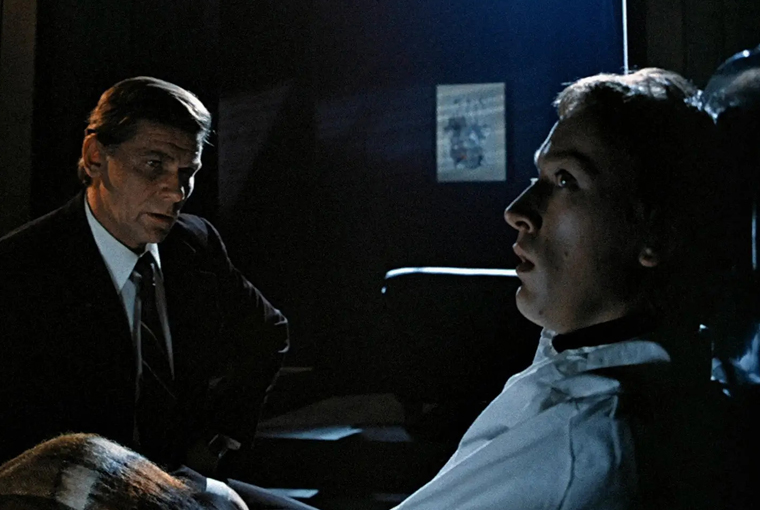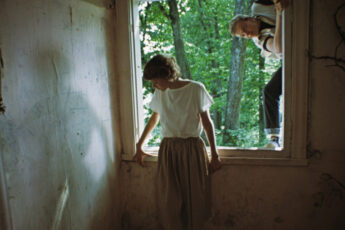“Stop This Goddamn Hypnosis!”
Grigori Kromanov’s Dead Mountaineer’s Hotel (Hukkunud Alpinisti hotell, 1979)
Vol. 145 (May 2024) by Jack Page
Based on the Strugatsky brothers’ 1970 science fiction novel Dead Mountaineer’s Hotel, Grigori Kromanov’s eponymous adaptation is as genre-defying as its literary basis. Blending detective noir iconography with experimental filmmaking, the film’s narrative is shrouded in such mystery and uncertainty that the impression made by the conclusion trumps any plot details and red herrings that the spectator may not have grasped in its entirety. Fortunately, not unlike a Shakespearian chorus, the protagonist Peter Glebsky’s voice-over, non-sequiturs, and rhetorical questions help the audience navigate the often abstract and philosophical dialog spoken between the other characters.
In summary, Glebsky – a police officer – is anonymously called out to a remote Alphine lodge where he is swiftly embroiled in a murder and missing persons case. Trapped in the hotel after an avalanche, his investigation will lead him through strange dealings and deceit with the other odd guests and their inevitable tragic demise. Once the lodgers are revealed to be otherworldly beings, Glebsky is offered a choice: uphold the law and arrest them, or allow them to flee to safety. The detective’s stubbornness and unshakable work ethic lead him to call in military support, who gun down the extraterrestrials. The explosion of the missiles on the mountain causes another final avalanche, killing all the remaining humans at the hotel.
The final scene of the film presents a medium close-up of Glebsky, clad head to toe in his official police uniform. The mise-en-scene of the shot is reminiscent of an interview, as if the inspector is on trial, pleading to a jury from behind a desk. The sepia tone of the scene creates an archival aesthetic with a bronze finish, like the raw, unedited look of news footage. Breaking the fourth wall, Glebsky makes a captivating speech to the camera that details his moral dilemma. He explains he is a lawman, not a scientist. His world is founded in the rational and he cannot comprehend the supernatural goings-on within the hotel. His unwavering loyalty to the government has unmoored his ethical compass. If the suspects are non-humans, we shouldn’t care what happens to them. If they are humans, then in the eyes of the law they are criminals and must be brought to justice. Uldis Pucitis’ intense performance slowly breaks down the stalwart demeanor of the previously resilient character. The once contemplative and composed Glebsky becomes panic-stricken, his eyes wild and his gestures frantic. Through his address to the audience, he seems to question himself, doubting the judgement he has made to kill the aliens. By the end of his declamation, it is clear he is trying to convince himself of the virtue (or lack thereof) of his final actions.
Although the setting of Dead Mountaineer’s Hotel remains technically undisclosed, it is clear that the atmosphere and ideology of the film is reflective of a nation in the grip of paranoia and censorship under Soviet rule. Glebsky embodies the stereotypical police investigator with his traditional wardrobe of monochrome suits, heavy brown leather jackets, and woolly turtlenecks. He is representative of the pressures of conformity and his constant stalking and interrogation of the hotel’s guests evoke the heavy-handed surveillance of Soviet citizens at the hands of its government. Ultimately, Glebsky’s authoritarian presence at the lodge is to question the unknown and counteract any symbols of otherness that do not align with the heteronormative status quo. Even before the guests are revealed to be alien lifeforms, some characters pose a threat due to their rebellion against normalcy. For example, the androgynous young man Olaf bests Glebsky in a game of pool in the parlor. He pots every ball during his turn, mounting the table in a flirtatious way that irks the inspector. Olaf’s undetermined gender and sexuality only add to his foreign demeanor, threatening Glebsky’s masculinity even further after he is defeated by such a chauvinistic display of sportsmanship.
Kromanov employs a variety of stylized techniques to build this awkward environment of suspicion and mounting dread. Set against the backdrop of snowy mountain vistas, Sven Grünberg’s eerie score mirrors the feeling of sheer isolation. As the sweeping aerial shots capture the blinding lights of the sun beams through the frosty treetops, the high-pitched sounds of the synthesizer gain momentum. Like a robotic orchestra, the ringing of the soundtrack feels shrill and metallic. The long, drawn-out notes waver in tempo, creating an aural unexpectedness and anticipation. The tune is layered upon itself, mimicking the sound of an echo reverberating off the walls of a deep cave. The score is both mechanical and organic, stuck in the realm of the uncanny between simulation and reality, alien and human. However, during a remarkable scene where the guests gather in the bar, the film’s style abruptly shifts in tone. A cosmic rock song replaces the film’s main theme, as the residents dance and celebrate. A yellow hue begins to invade the frame, its shades of gold and orange bounce off the wall lights and liquor bottles as Glebsky becomes increasingly intoxicated. The camera spirals around the dance floor, catching fleeting glimpses of the strangely acting guests and their bizarre dance routine. Green and red spotlights flicker over the drunk Glebsky’s face to the sound of a wailing electric guitar riff. It is a dizzying and hallucinatory experience for the spectator that stands out as an exceptionally psychedelic and experimental episode in an otherwise well-hidden genre piece.




Leave a Comment